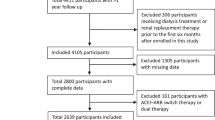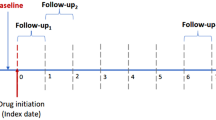Abstract
Background
Benefits and risks of angiotensin converting enzyme inhibitors (ACE-I) in advanced chronic kidney disease (CKD) are controversial. We tested the role of ACE-I in slowing the progression of renal damage in a real-world elderly population with CKD stage 5.
Methods
We evaluated all patients consecutively referred to our CKD stage 5 outpatient clinic from January 2002 to December 2013. Chronicity was defined as two consecutive estimated glomerular filtration rate (eGFR) measurements below 15 ml/min/1.73 m2. We retrieved parameters of interest at baseline and assessed eGFR reduction rate during follow-up. We estimated GFR by the 4-variable Modification of Diet in Renal Disease (MDRD) formula.
Results
Mean age of the 342 subjects analyzed was 72 years and eGFR 10 ml/min/1.73 m2. In the 188 patients on ACE-I at baseline, the subsequent annual rate of eGFR reduction was less than a third of that found in the 154 patients off ACE-I. Across phosphate quartiles, baseline eGFR significantly decreased while its annual reduction rate significantly increased. Of the original cohort, 60 patients (17 %) died, 201 (59 %) started dialysis and 81 (24 %) were still in conservative treatment at the end of the study. Multivariate analysis identified age, phosphate, proteinuria, baseline eGFR and its rate of progression as independent risk factors directly or inversely predictive of progression to dialysis. ACE-I use significantly reduced by 31 % the risk of dialysis.
Conclusions
Our study shows that proteinuria independently predicts further renal damage progression even in end-stage renal disease patients not yet in dialysis. In our cohort of elderly patients with very advanced CKD, ACE-I was effective in slowing down further renal damage progression.

Similar content being viewed by others
References
Couser WG, Remuzzi G, Mendis S, Tonelli M (2011) The contribution of chronic kidney disease to the global burden of major noncommunicable disease. Kidney Int 80(12):1258–1270
Eggers PW (2011) Has the incidence of end-stage renal disease in the USA and other countries stabilized? Curr Opin Nephrol Hypertens 20(3):241–245
Hsu CY, Vittinghoff E, Lin F, Shlipak MG (2004) The incidence of end-stage renal disease is increasing faster than the prevalence of chronic renal insufficiency. Ann Intern Med 141(2):95–101
James MT, Hemmelgam BR, Tonelli M (2010) Early recognition and prevention of chronic kidney disease. Lancet 375(9722):1296–1309
Jafar TH, Stark PC, Schmid CH, Landa M, Maschio G, de Jong PE, de Zeeuw D, Shahinfar S, Toto R, Levey AS, AIPRD Study Group (2003) Progression of chronic kidney disease: the role of blood pressure control proteinuria and angiotensin-converting enzyme inhibition: a patient level meta-analysis. Ann Intern Med 139(4):244–252
ESCAPE Trial Group, Wühl E, Trivelli A, Picca S, Litwin M, Peco-Antic A, Zurowska A, Testa S, Jankauskiene A, Emre S, Caldas-Afonso A, Anarat A, Niaudet P, Mir S, Bakkaloglu A, Enke B, Montini G, Wingen AM, Sallay P, Jeck N, Berg U, Caliskan S, Wygoda S, Hohbach-Hohenfellner K, Dusek J, Urasinski T, Arbeiter K, Neuhaus T, Gellermann J, Drozdz D, Fischbach M, Möller K, Wigger M, Peruzzi L, Mehls O, Schaefer F (2009) Strict blood-pressure control and progression of renal failure in children. N Engl J Med 361(17):1639–1650
Ruggenenti P, Perna A, Gherardi G, Gaspari F, Benini R, Remuzzi G (1998) Renal function and requirement for dialysis in chronic nephropathy patients on long-term ramipril: REIN follw-up trial. Gruppo Italiano di Studi Epidemiologici in Nefrologia (GISEN). Ramipril efficacy in nephropathy. Lancet 352(9136):1252–1256
Remuzzi G, Ruggenenti P, Perico N (2002) Chronic renal diseases: renoprotective benefits of renin-angiotensin system inhibition. Ann Intern Med 136(8):604–615
Wright JT, Bakris G, Greene T, Agodoa LY, Appel LJ, Charleston J, Cheek D, Douglas-Baltimore JG, Gassman J, Glassock R, Hebert L, Jamerson K, Lewis J, Phillips RA, Toto RD, Middleton JP, Rostand SG, African American Study of Kidney Disease and Hypertension Study Group (2002) Effect of blood pressure lowering and antihypertensive drug class on progression of hypertensive kidney disease: results from the AASK trial. JAMA 288(19):2421–2431
Ihle BU, Whitworth JA, Shahinfar S, Cnaan A, Kincaid-Smith PS, Becker GJ (1996) Angiotensin-converting enzyme inhibition in nondiabetic progressive renal insufficiency: a controlled double-blind trial. Am J Kidney Dis 27(4):489–495
Hou FF, Zhang X, Zhang GH, Xie D, Chen PY, Zhang WR, Jiang JP, Liang M, Wang GB, Liu ZR, Geng RW (2006) Efficacy and safety of benazepril for advanced chronic renal insufficiency. N Engl J Med 354(2):131–140
Ruggenenti P, Perna A, Remuzzi G (2001) ACE inhibitors to prevent end stage renal disease: when to start and why possibly never stop: a post hoc analysis of the REIN trial results. Ramipril efficacy in nephropathy. J Am Soc Nephrol 12(12):2832–2837
Stevens PE, Levin A, Kidney Disease Improving Global Outcomes Chronic Kidney Disease Guideline Development Work Group Members (2013) Evaluation and management of chronic kidney disease: synopsis of the kidney disease: improving global outcomes 2012 clinical practice guideline. Ann Intern Med 158(11):825–830
O’Hare AM, Kaufman JS, Covinsky KE, Seth Landefeld C, McFarland LV, Larson EB (2009) Current guidelines for using angiotensin II-receptor antagonists in chronic kidney disease: is the evidence base relevant to older adults? Ann Intern Med 150:717–724
Zoccali C, Ruggenenti P, Perna A, Leonardis D, Tripepi R, Tripepi G, Mallamaci F, Remuzzi G, REIN study group (2011) Phosphate may promote CKD progression and attenuate renoprotective effect of ACE inhibition. J Am Soc Nephrol 22(10):1923–1930
Brunori G, Viola BF, Parrinello G, De Biase V, Como G, Franco V, Garibotto G, Zubani R, Cancarini GC (2007) Efficacy and safety of a very-low-protein diet when postponing dialysis in the elderly: a prospective randomized multicenter controlled study. Am J Kidney Dis 49(5):569–580
Dattolo P, Michelassi S, Amidone M, Allinovi M, Vignali L, Antognoli G, Roperto R, Pizzarelli F (2015) Structured clinical follow-up for CKD stage 5 may safely postpone dialysis. J Nephrol 28:463–469
Levey AS, Coresh J, Greene T, Stevens LA, Zhang YL, Hendriksen S, Kusek JW, Van Lente F, Chronic Kidney Disease Epidemiology Collaboration (2006) Using standardized serum creatinine values in the modification of diet in renal disease study equation for estimating glomerular filtration rate. Ann Intern Med 145(4):247–254
Ahmed AK, Kamath NS, El Kossi M, El Nahas AM (2010) The impact of stopping inhibitors of the renin-angiotensin system in patients with advanced chronic kidney disease. Nephrol Dial Transplant 25(12):3977–3982
European Best Practice Guidelines Expert Group on Hemodialysis, European Renal Association (2002) Nephrol Dial Transplant S7: 7–15
National Kidney Foundation (2006) KDOQI Clinical practice guidelines and clinical practice recommendations for 2006 updates: hemodialysis adequacy, peritoneal dialysis adequacy and vascular access. Am J Kidney Dis 48:S1–S322
De Seigneux S, Courbebaisse M, Rutkowski JM, Wilhelm-Bals A, Metzger M, Khodo SN, Hasler U, Chehade H, Dizin E, Daryadel A, Stengel B; for the NephroTest Study Group, Girardin E, Prié D, Wagner CA, Scherer PE, Martin PY, Houillier P, Feraille E (2015) Proteinuria increases plasma phosphate by altering its tubular handling. J Am Soc Nephrol 26(7):1608–1618. doi:10.1681/ASN.2014010104
Zanchi C, Locatelli M, Benigni A, Corna D, Tomasoni S, Rottoli D, Gaspari F, Remuzzi G, Zoja C (2013) Renal expression of FGF23 in progressive renal disease of diabetes and the effect of ace inhibitor. PLoS One 8(8):e7077
Yilmaz MI, Sonmez A, Saglam M, Kurt YG, Unal HU, Karaman M, Gok M, Cetinkaya H, Eyileten T, Oguz Y, Vural A, Mallamaci F, Zoccali C (2014) Ramipril lowers plasma FGF-23 in patients with diabetic nephropathy. Am J Nephrol 40(3):208–214
Imanishi Y, Inaba M, Nakatsuka K, Nagasue K, Okuno S, Yoshihara A, Miura M, Miyauchi A, Kobayashi K, Miki T, Shoji T, Ishimura E, Nishizawa Y (2004) FGF-23 in patients with end-stage renal disease on haemodialysis. Kidney Int 65(5):1943–1946
Saito H, Kusano K, Kinosaki M, Ito H, Hirata M, Segawa H, Miyamoto K, Fukushima N (2003) Human fibroblast growth factor-23 mutant suppress Na-dependent phosphate co-transport activity and 1alpha, 25-dihydroxyvitamin D3 production. J Biol Chem 278(4):2206–2211
Shimada T, Hasegawa H, Yamazaki Y, Muto T, Hino R, Takeuchi Y, Fujita T, Nakahara K, Fukumoto S, Yamashita T (2004) FGF23 is a potent regulator of vitamin D metabolism and phosphate homeostasis. J Bone Miner Res 19(3):429–435
Yilmaz MI, Sonmez A, Saglam M, Yaman H, Kilic S, Demirkaya E, Eyileten T, Caglar K, Oguz Y, Vural A, Yenicesu M, Zoccali C (2010) FGF23 and vascular dysfunction in patients with stage 3 and 4 chronic kidney disease. Kidney Int 78(7):679–685
De Borst MH, Vervloet MG, ter Wee PM, Navis G (2011) Cross talk between the renin angiotensin aldosterone system and vitamin D-FGF-23-klotho in chronic kidney disease. J Am Soc Nephrol 22(9):1603–1609
Kendrick J, Cheung AK, Kaufman JS, Greene T, Roberts WL, Smits G, Chonchol M (2011) HOST Investigators: FGF-23 associates with death, cardiovascular events, and initiation of chronic dialysis. J Am Soc Nephrol 22(10):1913–1922
O’Hare AM, Hotchkiss JR, Kurella Tamura M, Larson EB, Hemmelgarn BR, Batten A, Do TP, Covinsky KE (2014) Interpreting treatment effects from clinical trials in the context of real-world risk information end-stage renal disease prevention in older adults. JAMA Intern Med 174(3):391–397
O’Hare AM, Choi AI, Bertenthal D, Bacchetti P, Garg AX, Kaufman JS, Walter LC, Mehta KM, Steinman MA, Allon M, McClellan WM, Landefeld CS (2007) Age affects outcomes in chronic kidney disease. J Am Soc Nephrol 18(10):2758–2765
Van Pottelbergh G, Den Elzen WP, Degryse J, Gussekloo J (2013) Prediction of mortality and functional decline by changes in eGFR in the very elderly: the Leiden 85-plus study. BMC Geriatr 18:13–61
Compliance with ethical standards
Conflict of interest
The authors declare that they have no conflict of interest.
Ethical approval
All procedures performed in studies involving human participants were in accordance with the ethical standards of the institutional and/or national research committee and with the 1964 Helsinki declaration and its later amendments or comparable ethical standards.
Informed consent
Informed consent was obtained from all individual participants included in the study.
Author information
Authors and Affiliations
Corresponding author
Rights and permissions
About this article
Cite this article
Dattolo, P.C., Gallo, P., Michelassi, S. et al. Conservative management of chronic kidney disease stage 5: role of angiotensin converting enzyme inhibitors. J Nephrol 29, 809–815 (2016). https://doi.org/10.1007/s40620-016-0290-9
Received:
Accepted:
Published:
Issue Date:
DOI: https://doi.org/10.1007/s40620-016-0290-9




